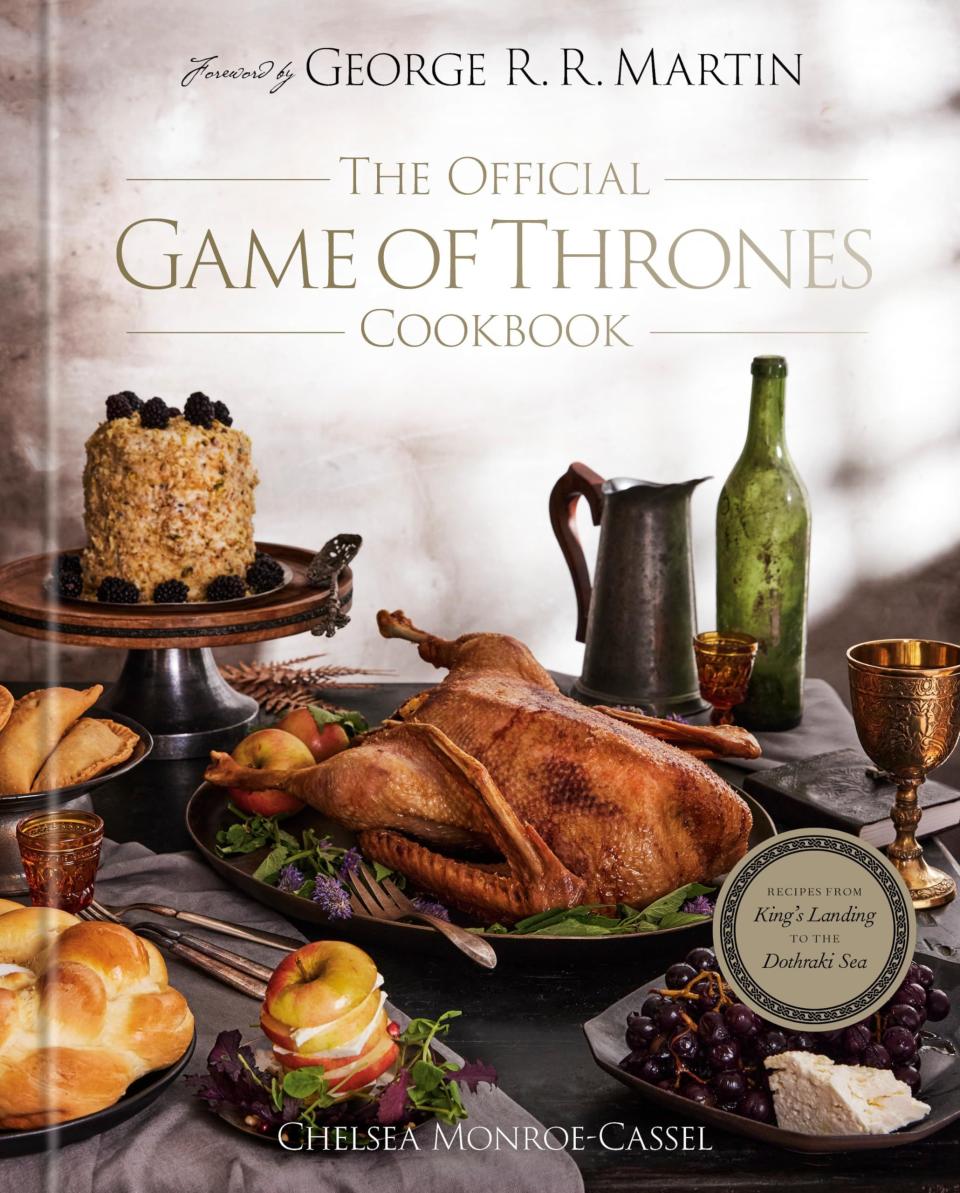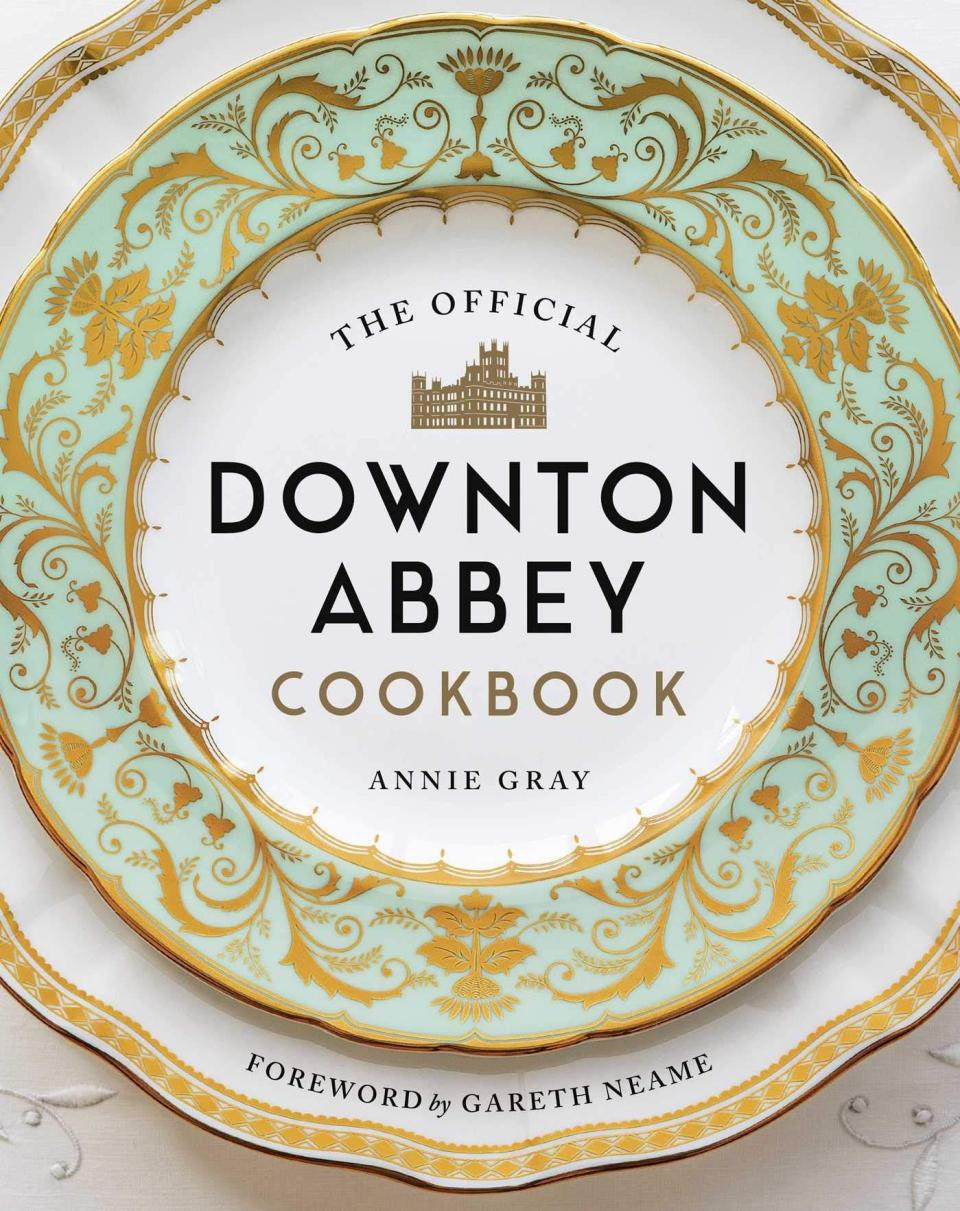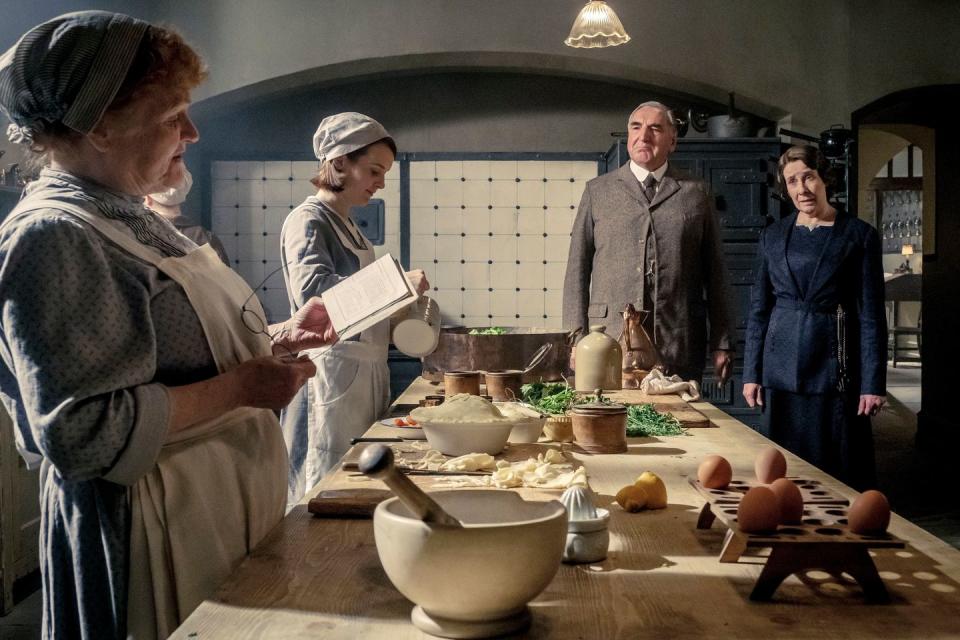How Fiction Became Edible

- Oops!Something went wrong.Please try again later.
"Hearst Magazines and Yahoo may earn commission or revenue on some items through these links."
When Chelsea Monroe-Cassel began chronicling the foods of Games of Thrones for her punnily named cookbook A Feast of Ice Fire, she looked for culinary inspiration in the recipes of the Middle Ages.
We’re talking properly medieval stuff. The sorts of recipes that assume you’ll be killing your own goat and will know by habit how to roast it, and that you’re already equipped with a kitchen where meals are prepared in cauldrons and curing salt is on the cutting edge of cooking technology. “They don't have timings, they don’t have ingredients, they don't have quantities,” Monroe-Cassel says. “So you have to pore through all kinds of related material to treasure hunt for details.”
It’s exactly the sort of offbeat gastronomic excursion that Monroe-Cassel has become familiar with throughout her career as a fictional food creator. Alongside feasting at the tables of Westeros, she has tasted the snacks of the USS Enterprise and drunk the soups of Tatooine. She’s eaten the lembas bread beloved by the hobbits of the Shire and tucked into the pies and stews of the fantasy world of Azeroth. She has traveled to places with her stomach that most people go only with their minds. Yet in making these journeys, she’s been far from alone.
The last decade has ushered in a wave of such fictional feasting through a genre of cookbooks that reverse engineer the foods of popular movies, television shows, books, and video games into recipes for the home kitchen. Thumb through The Official Harry Potter Cookbook and you’ll find instructions for whipping up a batch of Hagrid’s Dragon Eggs. Open The Unofficial Stranger Things Cookbook for a method of turning figs into Demogorgons. In The Official Witcher Cookbook, you’ll learn how to brew a Sorcerer’s Beef Stew, while Friends: The Official Cookbook breaks down how to make Monica’s Onion Galette. Pixar: The Official Cookbook includes tips on creating Toy Story 3’s Jelly Bean Burger, and The Unofficial Simpsons Cookbook reveals the secrets of the Flaming Moe (or as fans will surely know it, the Flaming Homer).

That’s just the tip of the iceberg. You can find recipe books for Godzilla, Ghostbusters, Titanic, Alien, Back to the Future, Avatar, The Lord of the Rings, Jurassic World, The Godfather, The Hunger Games, The Wizard of Oz, Home Alone, The Princess Bride, The Big Lebowski, Seinfeld, Doctor Who, The Walking Dead, Peaky Blinders, Bridgerton, The Office, Ted Lasso, Mad Men, Happy Days, Parks & Recreation, Teenage Mutant Ninja Turtles, Bob’s Burgers, Gilmore Girls, Adventure Time, Naruto, Lilo & Stitch, Rick and Morty, Pokémon, Minecraft, Street Fighter, Stardew Valley, Assassin’s Creed, Animal Crossing, Halo, The Sims, The Legend of Zelda, Final Fantasy, and many, many more.
The biggest of these books have sold hundreds of thousands of copies, retail bookstores often dedicate entire displays to them, and the appetite for the genre has grown so large that Monroe-Cassel has written a second Game of Thrones cookbook due to release in May. Some are officially licensed, meaning that they carry all the branding, artwork, and high-production value that their properties afford. Others are humbly titled “unofficial,” inching tentatively up to the line of copyright infringement. Many are hefty, hardback tomes created with immense detail and genuine love for their source material. And then there are the less convincing releases, stamped with the name of a popular franchise to warrant a glossy cover and high retail price.

amazon.com
$35.00
All, essentially, are merchandise, designed to entice enthusiasts of whatever pop culture license they’re tied to. Usually, that’s a franchise of some kind—one that commands a loyal audience, where a branded recipe book doesn’t look out of place next to shelves of t-shirts, plushies, hoodies, action figures, coffee table books, board games, and everything else publishers release to the baying delight of eager fans. But the best of them are extensions of the worlds on which they’re based, letting readers engage with their favorite fiction in a new way by getting a little physically closer to it.
“It's just a whole other way to cosplay,” says Elena Craig, a recipe developer who’s written cookbooks for the worlds of Harry Potter, Deadpool, and Hocus Pocus. They allow readers to bring their favorite fictional world to life, she thinks, and enlarge it to the point where they can partake in it themselves. For Tomb Raider superfan and fan-site owner Michelle Harris, Tomb Raider: The Official Cookbook and Travel Guide does more than just handily collect recipes from hero Lara Croft’s travels—it deepens her connection to the character’s journey. “You get to taste the food the locals would eat,” Harris says,” and by doing this, it gives you a little more insight into the areas Lara travels.”
Fantasy and science fiction stories are natural candidates for the model. They’re rife with imaginary foods to playfully recreate, and their expansive world-building often gestures toward the cuisines of their fictional peoples. “If the cookbook is for a TV show or movie, I rewatch it over and over again looking for food references,” says Jenn Fujikawa, a food writer who’s authored Star Wars, Ghostbusters, and Avengers cookbooks. “I really study the shows to build a proper backstory so that the recipe makes sense in world.”
Monroe-Cassel says the trick to recreating fictional foods often lies in finding real-world ingredients that can convincingly pose as imaginary alternatives—which may sound rather straightforward until you’re staring down the culinary canon of World of Warcraft and have to whip up dishes with names like Chimaerok Chops. With foods as made-up as these, where do you even begin? “So a rok is a bird, and a Chimaera is a lion-eagle-goat thing,” says Monroe-Cassel. “I can work with goat, but I can't find goat.” Anything else, then? “Let's do lamb!” The result is a lamb shoulder chop marinated in a nutmeg and Aleppo pepper flake rub, served with couscous or rice. Not bad for a dish that appears in the video game as only a small, vaguely food-shaped clump of brown pixels.
This is, of course, half the appeal. Not only do these foods offer new sensory gateways into fictional worlds, but when they’re cooked, you get to eat them. “I want my cookbooks to be fun to use at home for watch parties, so I like to make sure the food isn’t too daunting that people wouldn’t even want to try to make it,” says Fujikawa.
The more children-oriented cookbooks often contain novelty dishes, like the Dobby-shaped cupcakes of the The Official Harry Potter Baking Book, or the Splash Zone cocktail of Jurassic World: The Official Cookbook that arranges marshmallows around the rim of a glass to (sort of) look like the toothed mouth of a dinosaur. “You want to make sure everyone feels included, especially in comics,” says Michelin starred chef Paul Eschbach, who created the recipes of the upcoming Marvel: Spider-Man: The Official Cookbook. “We’re not making up a cookbook for Noma here. What is Peter Parker going to eat?”
It’s exactly the sort of question we’ve been asking of our favorite characters for decades. Pop culture cookbooks may be enjoying a newfound popularity, but the genre is hardly new. Cult soap opera Dark Shadows received a cookbook tie-in back in 1970, and Marvel put out a collection of superhero-inspired recipes a few years later. Trekkies got their first recipe book in 1999, while The Sopranos Family Cookbook followed in 2002.
These early titles, though, were few and far between, and it wasn’t until the 2012 publication of Monroe-Cassel’s first Game of Thrones cookbook that the genre took off in earnest. She and a friend had started a blog the year before to showcase their take on foods from the beloved book series; then, they sent a tongue-in-cheek email to author George R.R. Martin suggesting they team up for an official collection. “Not only did he write back,” Monroe-Cassel says, but he told his publishers to get on it. “Turns out that whatever George Martin wants, George Martin gets.”
It helped that the Game of Thrones TV adaptation had just started airing, enthusing a fresh audience to the lore of Westeros and creating a new batch of fans to lap up merch of the hottest prestige television show of the moment. At the same time, the Marvel Cinematic Universe was inching toward its eventual domination of the Hollywood box office. Suddenly, sweeping imaginary worlds became the commercial tentpoles of pop culture. Understanding their expansive lore was no longer lazily seen as the purview of geeks, nerds, and other unpleasant stereotypes, but practically necessary if you wanted to keep up with the latest watercooler chat in the office.
“Everyone can be geeky these days and it's not frowned upon,” says Nicolle Lamerichs, lecturer in creative business at University of Applied Sciences Utrecht, who specializes in studying fandom and media. “That even your average uncle is watching these shows and is super invested in them helps to see how fans are part of the mainstream.”
Bertha Chin, lecturer in social media and communication at Swinburne University of Technology and co-editor of Eating Fandom: Intersections Between Fans and Food Cultures, remembers when fandom was chiefly expressed and enjoyed at Comic Cons, clubs, and other underground events. Fans would meet up for a weekend to enjoy their shared interests before returning to their normal lives come Monday morning. “Now everywhere you turn on Twitter or TikTok, people are just sharing their fandom,” she says. “A lot of it has to do with social media making everything more accessible.”
With likeminded people just a few clicks away, it’s easier than ever to find a community that shares an interest in whatever characters, worlds, or creators you love. And with potentially thousands of other internet users always ready to chat, speculate, argue, and share memes online—anonymous or otherwise—you need never stop. A burgeoning interest can quickly become a hobby, and it doesn’t take that much screen time for a hobby to become an obsession.
It’s music to the ears of publishers looking for an easy payday. To some degree, fans are the perfect consumers: they’re loyal, dedicated, and have at least some level of pre-existing interest in branded products. Pitch a product right and you’ll open the door to a readymade audience. Or try an outlandish idea like, say, a tie-in cookbook, and you’ve got a good chance of finding a gap that fans have been waiting to fill. As a big Star Trek fan, for instance, Lamerichs owns various bits of merch, including things like fictional travel guides to Planet Vulcan and other locations in the show. “But the nice thing with a cookbook is that in a way it's interactive,” she says. “It's about recreating these dishes and fantasizing about these dishes. It's about thinking: if this had existed for real, how would we go about creating it? There is more creativity to it than wearing a t-shirt.”

amazon.com
$18.29
Yet there’s also something undeniably peculiar about it all. It’s a strange, almost amusing exercise to reduce the world’s most commercially and critically beloved franchises to items that can fit on a kitchen shelf. It’s not only that these blockbuster worlds seem too big for the pages of a recipe book, but that recipe books themselves sit in an altogether different domain. They belong to the mainstream. Pop culture cookbooks, then, seem to straddle the divide, extending fandom to the very consumers who are typically thought of as outside it. Or to put it another way, while you probably won’t catch many Downton Abbey fans walking around in graphic tees or adding to their Funko Pop collections, a great deal of them will be exactly the sort of people to enjoy a good recipe collection.
For food historian Annie Gray, there’s more to it than just business savvy. When she was asked to create the official cookbook of Downton Abbey, she was most interested in how the format could be a useful vehicle. She remembers thinking, “I can use this to put across the actual history of the period tied into a series that people really love. This is a really good opportunity to get real history in front of an audience of people who are already receptive.”
Much like the television shows on which they’re based, the recipes in Gray’s Official Downton Abbey Cookbook and Call the Midwife: The Official Cookbook are inspired by the ingredients and tastes of their eras, but tweaked to be more palatable for a modern audience. Every recipe is introduced by an explanation of its origins and development, and sections are interspersed with short essays discussing the trends, industries, and forces that influenced English cooking of the time. It’s a far cry from some of the other pop culture cookbooks Gray remembers reading in preparation. Many, she says, made basic historical errors, while an unofficial Downton Abbey cookbook seemed to think the fictional stately home was somehow connected to England’s monastic “abbeys” dissolved in the Reformation of the 16th century.

Errors that egregious are thankfully rare, but it’s still not too hard to spot the cash grabs of the genre. Cast your eye across a random selection of pop culture cookbooks and you’ll quickly see brands so devoid of culinary material, or so infertile for expansion, that slapping their name on a recipe book seems little more than cynical. Will fans of 16-bit video games really get much from Sonic the Hedgehog: The Official Cookbook? Will Fast & Furious: The Official Cookbook have anything to teach a burgeoning gourmand? And does Catan, a nearly 30-year-old board game that includes no mention of food other than the odd picture of a bushel of wheat, have much to offer a home cook? For obsessives, maybe. For those looking for an easy birthday gift for an obsessive, probably. And for publishers, certainly.
“These books have been really selling well and getting really great placement,” says Casie Vogel, vice president and publisher at Ulysses Press, who published Catan: The Official Cookbook last year. Picking recipes for that book, she says, involved choosing foods that could tie into the game through wordplay, or those that could be shared by a group of friends during a board game night. But selecting the license for a cookbook is more business-minded. “It's a lot of discussion about who do we think the audience is for these shows, movies, or whatever the pop culture tie-in is,” Vogel says, “and going from there to see if those are people that we think are book buyers who kind of get this stan-fan culture.”
Brenna Connor, manager of US books industry insights at the market research firm Circana, says that such licensing is now an important part of the book market at large. In the US between 2013 and 2023, the number of published licensed books more than doubled, and while cookbook sales are down from their pandemic peak, licensed cookbooks of all varieties represent one pocket of growth. Many are not tied to pop culture brands, but to individuals who’ve made a name for themselves on TikTok, YouTube and other social media platforms, including B. Dylan Hollis, Joshua Weissman, Nick DiGiovanni, Barbara Costello, and Joanne Lee Molinaro.
These authors are effectively the modern incarnations of the TV chef. “On average in 2023, cookbook sales for these TikTok stars outperformed the top 100 cookbooks by 600%,” says Connor. In fact, looking at licensed books across all adult categories, the licensed cookbook is the top area of growth, with sales reaching 2.2 million books in 2023. “The titles driving the most growth are coming from licenses with strong brand loyalty, like Disney Parks, Yellowstone, Dungeons & Dragons, Minecraft, and Hocus Pocus,” says Connor.
It’s a trend the publishing industry has fully embraced. Consider the case of UK imprint Expanse, which was set up by mega-publisher HarperCollins to specifically focus on the biggest properties across gaming, TV, and film. Its mantra is “books for fans, by fans”—a motto that couldn’t better summarize the way publishers are betting on the ever-growing appetite of fandoms. Says Expanse publishing director John Packard, “I think there is a lot of nostalgia for these brands. Either for something you played or watched as a kid, or spent hundreds of hours of your life immersed in. People want to carry on that experience and continue engaging with that world, and cookbooks are one fun way of doing that.”
It’s not like their creators are going to run out of material anytime soon. “We’ve got other offshoots of it, whether it's baking, cocktails, or entertaining”, says Vanessa Lopez, who oversees licensing and partnerships at publisher Insight Editions. “And there's always new media being created that gives us opportunity for this sort of publishing.”
Are we set, then, to wade through ever more of these novelty recipe collections, created with varying degrees of quality and love, yet published ultimately for the reliable financial return promised by the brands and characters and worlds to which we’ve grown loyally attached? Yes, probably. But is that so bad?
When writer and comic historian Jermaine McLaughlin was approached to pen the words of Marvel: Spider-Man: The Official Cookbook, the whole project seemed a bit of a head-scratcher. But after going through the process and seeing the final collection of recipes —taken from across the five boroughs of New York as seen through Spider-Man’s mask—he understands the appeal. “There's something pretty fun about being able to marry people's culinary interest—even if it’s, like mine, a surface-level interest—with these characters,” he says “It makes the read a bit more fun, and it may help people discover recipes that they may not have even known they were interested in.”
The best fiction has always challenged conventional taste. Now, it’s just doing that in more ways than one.
You Might Also Like

